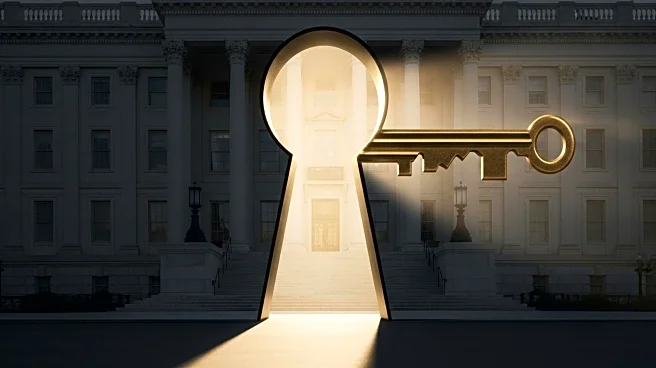What's Happening?
The White House is examining a potential loophole in the Government Employee Fair Treatment Act of 2019, which mandates back pay for federal workers furloughed during a government shutdown. A draft memo suggests that furloughed workers may not automatically receive back pay once the shutdown ends, contrary to the Office of Personnel Management's guidance. The memo argues that back pay is contingent upon Congress appropriating funds after the shutdown. This interpretation has sparked debate, with Republicans and the White House urging Democrats to support a GOP-backed continuing resolution to fund the government temporarily. The Senate has rejected both Republican and Democratic short-term spending bills, and the House is not scheduled to vote until October 14.
Why It's Important?
The potential reinterpretation of the law could significantly impact federal workers, who rely on back pay to cover expenses during shutdowns. If the White House's interpretation prevails, it could set a precedent affecting future shutdowns and federal employee compensation. This situation adds pressure on Congress to resolve the funding impasse, as the livelihoods of federal workers hang in the balance. The debate also highlights the political maneuvering involved in government funding negotiations, with both parties using the issue to leverage their positions.
What's Next?
Congress faces increasing pressure to address the funding gap and ensure federal workers receive back pay. The House is set to reconvene on October 14, potentially advancing discussions on a resolution. Meanwhile, federal employee unions and Democratic lawmakers are likely to challenge the White House's interpretation, advocating for adherence to the 2019 law. The outcome of these negotiations could influence future legislative approaches to government shutdowns and employee compensation.
Beyond the Headlines
The situation underscores the ethical considerations of using federal worker compensation as a bargaining tool in political negotiations. It raises questions about the fairness and reliability of government employment during fiscal crises. Long-term, this could affect federal workforce morale and recruitment, as potential employees weigh the risks of job security against political volatility.









